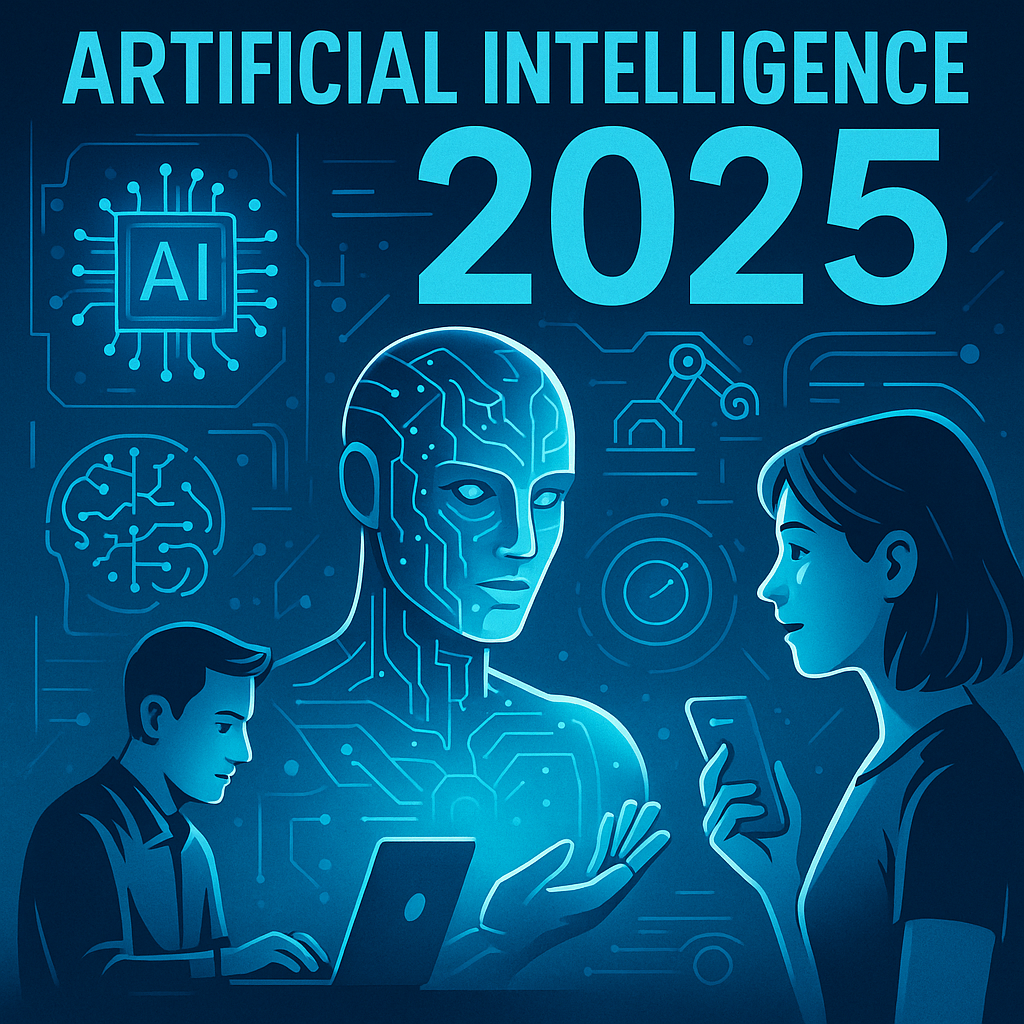Top 10 Powerful Trends

| Heading | Description |
|---|---|
| Introduction | The importance of AI in shaping the digital future |
| A Brief History of Artificial Intelligence | From Alan Turing to GPT-4 |
| Top AI Trends in 2025 | The most influential advancements in AI this year |
| Real-world Applications of AI | Healthcare, education, finance, and more |
| Challenges and Opportunities in AI | Ethics, jobs, bias, and new innovations |
| The Future of Artificial Intelligence | What’s next for humanity and machines |
| Conclusion | Summary and strategic takeaways |
Introduction
Artificial Intelligence (AI) is no longer a futuristic concept—it’s a powerful force redefining industries and lives in 2025. From healthcare to education, from finance to entertainment, AI is reshaping how we interact with the world. In this in-depth article, we’ll explore the latest trends in artificial intelligence, examine its practical applications, and forecast its impact on the near and distant future.
🕰️ A Brief History of Artificial Intelligence
AI’s roots can be traced back to visionaries like Alan Turing, who questioned whether machines could think. Over decades, this question fueled developments in symbolic reasoning, expert systems, and eventually, machine learning and neural networks. By 2025, AI has evolved into a hybrid of software and cognitive science that powers systems capable of generating content, analyzing medical data, and even composing symphonies.
📈 Top AI Trends in 2025
Generative AI
Tools like ChatGPT, MidJourney, and Synthesia are revolutionizing content creation with realistic text, video, and audio generation.
Agentic AI
Smart agents that can make autonomous decisions are transforming customer service, robotics, and personal assistance.
Multimodal AI
AI models can now simultaneously process text, images, video, and audio—enabling rich, interactive, and human-like experiences.
AI in Education
Personalized tutoring systems adapt to learning styles, improve engagement, and close knowledge gaps.
AI in Healthcare
AI-driven diagnostics, robotic surgeries, and predictive analytics are setting new standards in medical excellence.
🏭 Real-world Applications of AI
Healthcare
AI systems assist in diagnosing rare diseases, interpreting medical imagery, and predicting patient outcomes.
Education
AI customizes learning paths and monitors student progress in real time, enhancing educational equity.
Finance
Robo-advisors, fraud detection systems, and algorithmic trading exemplify AI’s role in modern finance.
Manufacturing
Predictive maintenance and AI-powered robotics are boosting productivity and reducing operational costs.
⚠️ Challenges and Opportunities in AI
Challenges
- Data Privacy: Massive data collection raises serious concerns over privacy and surveillance.
- Job Displacement: Automation risks eliminating certain categories of jobs.
- Algorithmic Bias: Unchecked datasets may reinforce racial, gender, or economic bias.
Opportunities
- Innovation: AI fuels breakthroughs in scientific research and product design.
- Efficiency: Enhanced decision-making and automation save time and money.
- Accessibility: AI can make services and tools more available to remote or underserved areas.
🔮 The Future of Artificial Intelligence
The horizon of AI stretches far beyond 2025. As quantum computing integrates with AI, and ethical frameworks mature, we’re likely to see safer, more powerful, and more personalized AI experiences. From co-pilots in our creative projects to collaborators in complex problem-solving, AI will continue enhancing human potential.
❓ Frequently Asked QuestionsWhat is artificial intelligence?
Artificial Intelligence refers to machines designed to mimic human cognitive functions like learning, problem-solving, and decision-making.
How is AI different from machine learning?
Machine learning is a subset of AI focused on algorithms that improve through data, whereas AI includes rule-based systems and logic-driven programming too.
Can AI replace humans?
In specific tasks, yes. But AI is best seen as an assistant or enhancer, not a complete substitute for human intuition and ethics.
Is AI dangerous?
AI can be dangerous if misused or left unchecked, but ethical use and regulation can mitigate most risks.
How do I learn AI skills?
Start with Python, take online courses on machine learning, and practice building simple models using open-source datasets.
Which industries benefit the most from AI?
Healthcare, finance, logistics, education, marketing, and entertainment are currently experiencing the most transformation.
🧾 Conclusion
Artificial Intelligence in 2025 isn’t just hype—it’s a game-changing toolkit that empowers individuals and organizations. Understanding how AI works, where it’s headed, and how to use it responsibly is essential for thriving in the digital age. Stay informed, stay ethical, and embrace AI as your next superpower.


